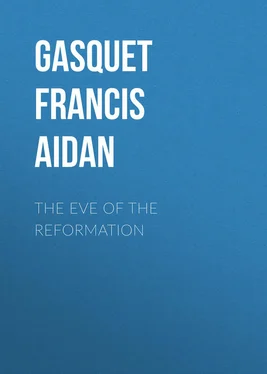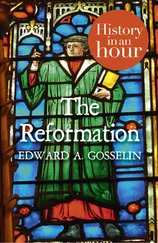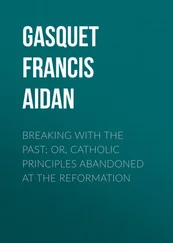Francis Gasquet - The Eve of the Reformation
Здесь есть возможность читать онлайн «Francis Gasquet - The Eve of the Reformation» — ознакомительный отрывок электронной книги совершенно бесплатно, а после прочтения отрывка купить полную версию. В некоторых случаях можно слушать аудио, скачать через торрент в формате fb2 и присутствует краткое содержание. Жанр: foreign_antique, foreign_prose, на английском языке. Описание произведения, (предисловие) а так же отзывы посетителей доступны на портале библиотеки ЛибКат.
- Название:The Eve of the Reformation
- Автор:
- Жанр:
- Год:неизвестен
- ISBN:нет данных
- Рейтинг книги:3 / 5. Голосов: 1
-
Избранное:Добавить в избранное
- Отзывы:
-
Ваша оценка:
- 60
- 1
- 2
- 3
- 4
- 5
The Eve of the Reformation: краткое содержание, описание и аннотация
Предлагаем к чтению аннотацию, описание, краткое содержание или предисловие (зависит от того, что написал сам автор книги «The Eve of the Reformation»). Если вы не нашли необходимую информацию о книге — напишите в комментариях, мы постараемся отыскать её.
The Eve of the Reformation — читать онлайн ознакомительный отрывок
Ниже представлен текст книги, разбитый по страницам. Система сохранения места последней прочитанной страницы, позволяет с удобством читать онлайн бесплатно книгу «The Eve of the Reformation», без необходимости каждый раз заново искать на чём Вы остановились. Поставьте закладку, и сможете в любой момент перейти на страницу, на которой закончили чтение.
Интервал:
Закладка:
Francis Aidan Gasquet
The Eve of the Reformation / Studies in the Religious Life and Thought of the English / people in the Period Preceding the Rejection of the Roman / jurisdiction by Henry VIII
CHAPTER I
INTRODUCTION
The English Reformation presents a variety of problems to the student of history. Amongst them not the least difficult or important is the general question, How are we to account for the sudden beginning and the ultimate success of a movement which, apparently at least, was opposed to the religious convictions and feelings of the nation at large? To explain away the difficulty, we are asked by some writers to believe that the religious revolution, although perhaps unrecognised at the moment when the storm first burst, had long been inevitable, and indeed that its issue had been foreseen by the most learned and capable men in England. To some, it appears that the Church, on the eve of the Reformation, had long lost its hold on the intelligence and affection of the English people. Discontented with the powers claimed by the ecclesiastical authority, and secretly disaffected to much of the mediæval teaching of religious truth and to many of the traditional religious ordinances, the laity were, it is suggested, only too eager to seize upon the first opportunity of emancipating themselves from a thraldom which in practice had become intolerable. An increase of knowledge, too, it is supposed, had inevitably led men to view as false and superstitious many of the practices of religion which had been acquiesced in and followed without doubt or question in earlier and more simple days. Men, with the increasing light, had come to see, in the support given to these practices by the clergy, a determination to keep people at large in ignorance, and to make capital out of many of these objectionable features of mediæval worship.
Moreover, such writers assume that in reality there was little or no practical religion among the mass of the people for some considerable time before the outbreak of the religious difficulties in the sixteenth century. According to their reading of the facts, the nation, as such, had long lost its interest in the religion of its forefathers. Receiving no instruction in faith and morals worthy of the name, they had been allowed by the neglect of the clergy to grow up in ignorance of the teachings, and in complete neglect of the duties, of their religion. Ecclesiastics generally, secular as well as religious, had, it is suggested, forfeited the respect and esteem of the laity by their evil and mercenary lives; whilst, imagining that the surest way to preserve the remnants of their former power was to keep the people ignorant, they had opposed the literary revival of the fifteenth century by every means at their command. In a word, the picture of the pre-Reformation Church ordinarily drawn for us is that of a system honeycombed with disaffection and unbelief, the natural and necessary outcome of an attempt to maintain at all hazards an effete ecclesiastical organisation, which clung with the tenacity of despair to doctrines and observances which the world at large had ceased to accept as true, or to observe as any part of its reasonable service.
In view of these and similar assertions, it is of interest and importance to ascertain, if possible, what really was the position of the Church in the eyes of the nation at large on the eve of the Reformation, to understand the attitude of men’s minds to the system as they knew it, and to discover, as far as may be, what in regard to religion they were doing and saying and thinking about, when the change came upon them. It is precisely this information which it has hitherto been difficult to get, and the present work is designed to supply some evidence on these matters. It does not pretend in any sense to be a history of the English Reformation, to give any consecutive narrative of the religious movements in this country during the sixteenth century, or to furnish an adequate account of the causes which led up to them. The volume in reality presents to the reader merely a series of separate studies which, whilst joined together by a certain connecting thread, must not be taken as claiming to present any complete picture of the period immediately preceding the Reformation, still less of that movement itself.
This is intentional. Those who know most about this portion of our national history will best understand how impossible it is as yet for any one, however well informed, to write the history of the Reformation itself or to draw for us any detailed and accurate picture of the age that went before that great event, and is supposed by some to have led up to it. The student of this great social and religious movement must at present be content to address himself to the necessary work of sifting and examining the many new sources of information which the researches of late years have opened out to the inquirer. For example, what a vast field of work is not supplied by the Calendar of Papers, Foreign and Domestic, of the Reign of Henry VIII. alone! In many ways this monumental work may well be considered one of the greatest literary achievements of the age. It furnishes the student of this portion of our national history with a vast catalogue of material, all of which must be examined, weighed, and arranged, before it is possible to pass a judgment upon the great religious revolution of the sixteenth century. And, though obviously affording grounds for a reconsideration of many of the conclusions previously formed in regard to this perplexing period, it must in no sense be regarded as even an exhaustive calendar of the available material. Rolls, records, and documents of all kinds exist in public and private archives, which are not included in these State Papers, but which are equally necessary for the formation of a sound and reliable opinion on the whole story. Besides this vast mass of material, the entire literature of the period demands careful examination, as it must clearly throw great light on the tone and temper of men’s minds, and reveal the origin and growth of popular views and opinions.
Writers, such as Burnet, for example, and others, have indeed presented their readers with the story of the Reformation as a whole, and have not hesitated to set out at length, and with assurance, the causes which led up to that event. Whether true or false, they have made their synthesis, and taking a comprehensive view of the entire subject, they have rendered their story more plausible by the unity of idea it was designed to illustrate and confirm. The real value of such a synthesis, however, must of course entirely depend on the data upon which it rests. The opening up of new sources of information and the examination of old sources in the critical spirit now demanded in all historical investigations have fully proved, however, not merely this or that fact to be wrong, but that whole lines of argument are without justification, and general deductions without reasonable basis. In other words, the old synthesis has been founded upon false facts and false inferences.
Whilst, however, seeing that the old story of the Reformation in England is wrong on some of the main lines upon which it depended, it is for reasons just stated impossible at present to substitute a new synthesis for the old. However unsatisfactory it may appear to be reduced to the analysis of sources and the examination of details, nothing more can safely be attempted at the present time. A general view cannot be taken until the items that compose it have been proved and tested and found correct. Till such time a provisional appreciation at best of the general subject is alone possible. The present volume then is occupied solely with some details, and I have endeavoured mainly by an examination of the literature of the period in question to gather some evidence of the mental attitude of the English people towards the religious system which prevailed before the rejection of the Roman jurisdiction by Henry VIII.
Читать дальшеИнтервал:
Закладка:
Похожие книги на «The Eve of the Reformation»
Представляем Вашему вниманию похожие книги на «The Eve of the Reformation» списком для выбора. Мы отобрали схожую по названию и смыслу литературу в надежде предоставить читателям больше вариантов отыскать новые, интересные, ещё непрочитанные произведения.
Обсуждение, отзывы о книге «The Eve of the Reformation» и просто собственные мнения читателей. Оставьте ваши комментарии, напишите, что Вы думаете о произведении, его смысле или главных героях. Укажите что конкретно понравилось, а что нет, и почему Вы так считаете.












